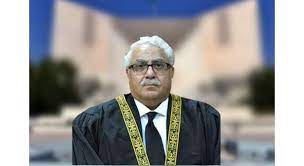The Supreme Judicial Council has issued a show cause notice to Justice Mazahar Ali Akbar Naqvi and directed him to file a written reply by November 10 to respond to the audio leak scandal.
During a recent meeting, the Supreme Judicial Council took up the case of apex Court’s judge Justice Mazahar Ali Akbar Naqvi for his alleged involvement in the audio leak scandal, and abuse of authority/position.
According to the details, multiple complaints have been filed by over a dozens individuals/ political groups and lawyers’ forums against Mr. Naqvi for his alleged involvement in corruption cases and alleged use of his influence to facilitate his sons and a daughter studying abroad and of financial gains from a business tycoon, Mr. Zahid Rafique. As said, the Supreme Judicial council also discussed complaints against several other judges including former NAB Chairman, Justice retired Javed Iqbal, former Chief Justice Umar Atta Bandial, and others.
Accountability, discipline and answerability for conduct and character is the essence of each institution and quality of every government servant and public leader. The Islamic teaching, the country’s constitution, social and professional ethics all stress on professional acumen and uprightness for each responsible citizen, while the prerogative of adjudicators merits more cautiousness and responsibility.
Unfortunately, the Pakistani judiciary could not build high professionalism, institutional prestige and judicial distinctiveness. The country’s judiciary has no reliable system of monitoring, self-evaluation and accountability of its judges and the lower staff, while this sacred cow is far behind the reach of the subordinate LEAs including Police, Anti-Corruption Department and the FIA.
The ploy of self accountability is just a derision with the constitution as well as the public because no bureaucrat ever moves against his colleague due to fear of future reprisal, departmental courtesy and nepotism.
Historically, there is no single example in the history of Pakistan that the Supreme Judicial Council or any higher court moved against its subordinate judges on institutional level until and unless his misconduct became a public issue and pressure mounted from the government and the masses.
There should be a comprehensive mechanism consisting of government leaders, public and media representatives which ensure across the board accountability of government servants including judiciary, military and civil bureaucracy so a real culture of transparency could be ensured in all departments and no sacred cow elud this essential aspect in any guise in the future.







